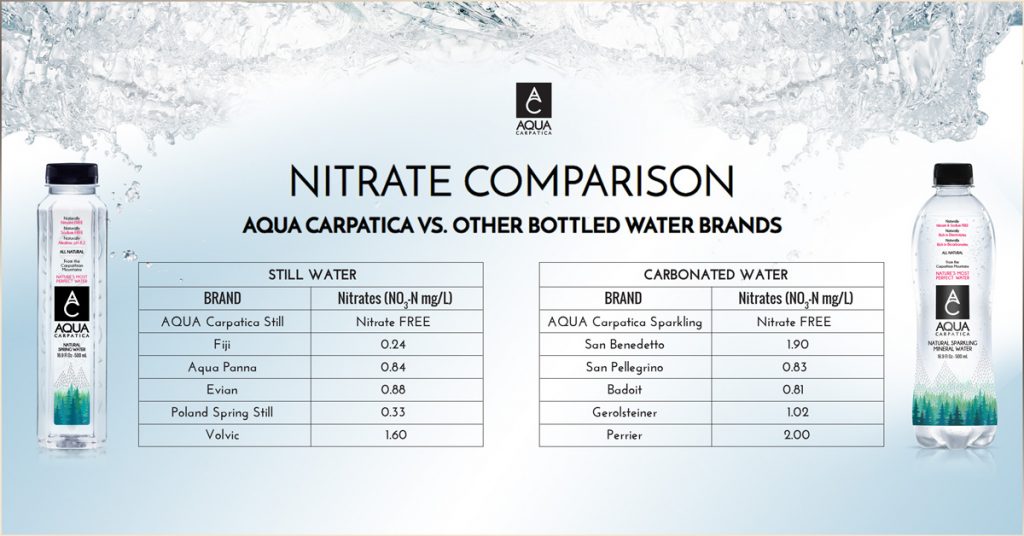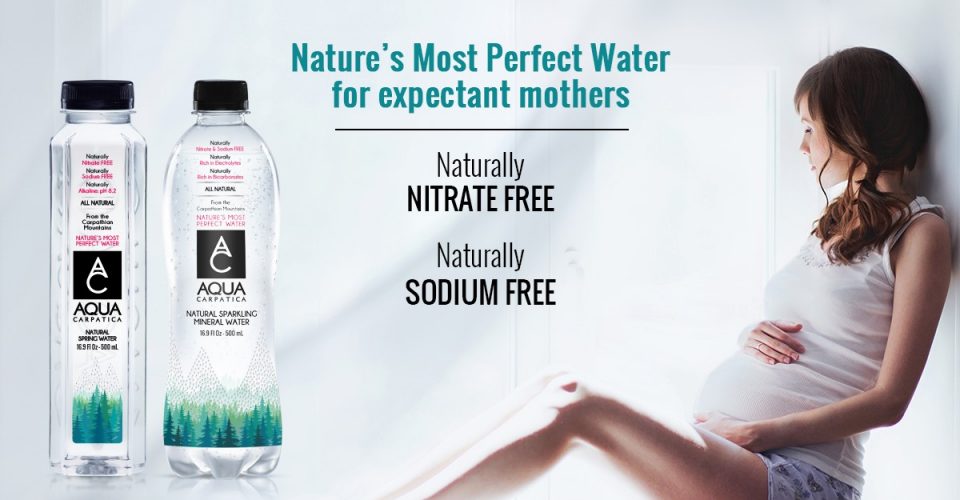The human body needs about 2 liters of water daily in order to function properly. But does this mean it’s good to drink any kind of water? How important is it to know how to read a label correctly and to avoid harmful chemicals?
WHAT ARE NITRATES AND WHAT ROLE DO THEY PLAY?
Nitrates and nitrites are natural components of the soil and part of the nitrogen cycle. They come from the mineralization of organic nitrogen compounds derived from plants and animals.
Part of the nitrates is absorbed by plant roots and serves as food for the synthesis of proteins and other nitrogen compounds. The leftover surplus contaminates groundwater and can be found in rivers, lakes and groundwater.
Naturally, there is a balance between nitrates in soil, water and plants. But human activity disrupts this balance through intensive use of natural organic fertilizers in agriculture – especially synthetic nitrogen. Fertilizers enrich the soil, but they also bring with them and nitrates, which accumulate in plants until they reach levels harmful to consumers.
In nature, in areas untouched by humans, the nitrates found in the soil are between 0 and 2.5 mg per liter, according to the E.P.A. (United States Environmental Protection Agency), W.H.O. (World Health Organization), and I.A.R.C. (International Agency for Research on Cancer). When the amount of nitrates in the soil exceeds 2.5mg per liter, then the most likely cause is pollution by humans, and this means the the area is not pristine and untouched.
WATER POLLUTION IN EUROPE
The major source of water pollution in Europe is the agricultural use of nitrates in organic fertilizers, according to the E.U. Directive on Nitrates, 1991.
The directive, which can be read in full here, bans the use of nitrates in organic fertilizers, since chemicals in intensive agriculture programs (started in the 60s and 70s) generated a major source of pollution across Europe.
Since water does not stay within national boundaries, and since protecting water quality is a key element of European environmental policy, there was a need for a legislative framework to solve the problem. This is why the 1991 Nitrates Directive was passed, one of the first pieces of E.U. legislation designed to control pollution and improve water quality. All the Member States have drawn up action programs.
HOW DOES THE INTAKE OF NITRATES AFFECT OUR HEALTH?
Once ingested and coming into contact with the stomach’s bacterial flora, nitrates turn into nitrites, which are much more toxic than nitrates.
The ingestion of a large quantity of nitrates may have serious consequences, including high blood pressure, thyroid and circulation problems, severe headaches, hives, blood poisoning, severe cyanosis, and, in the long term, even some types of cancer.
According to the norms of the A.F.S.S.A. (the French Food Health and Safety Agency), mineral and spring water can only be labeled ‘suitable for infants’ if its nitrate content is less than 2.27mg per liter. In the U.S. there is no specific regulation regarding nitrates and infants. There is a Maximum Contaminant Level of 10mg per liter for nitrate-nitrogen (NO3-N) in all waters.
Under certain conditions, nitrates can lead to the formation of nitrosamines, substances involved in the development of some cancers. In addition, nitrates form a stable compound with hemoglobin, methemoglobin, which reduces hemoglobin’s the ability to carry oxygen, resulting in a range of conditions, from simple headaches to severe cyanosis and even death, particularly in infants who ingest water containing more than 2.27 mg of nitrate-N per liter.
Newborns are the most vulnerable to nitrate contamination, because their micro-bacterial flora has not yet developed yet to fight it. Nitrates are nitrogen derivatives that can be found in the water natural circuit. Once ingested and coming into contact with the bacterial flora of the stomach, they are converted into highly toxic nitrites. The ingestion of a larger than recommended quantity can cause the following: gastric problems, infectious diarrhea, hives and rashes, and blue baby syndrome.
Blue baby syndrome, or Methemoglobinemia, first manifests itself in the form of respiratory problems due to inadequate circulation of oxygen through the bloodstream, leading to asphyxiation and even death. It is caused by nitrates turning into nitrites in the baby’s body, cutting off the supply of oxygen in the blood. Experts point to the importance of clean water with a low as possible nitrate content.
There is also a proven correlation between birth defects and high nitrate levels in expecting mothers. Researchers at Texas University have published a study that examines the relation between prenatal exposure to drinking-water nitrates and various birth defects. They found that higher water nitrate intake was associated with several birth defects in infants after birth. Their conclusion was that expecting and breastfeeding women should avoid drinking water with nitrate levels greater than 2.27 mg of NO3-N per liter.
There is much scientific research to suggest that nitrates can cause increased risks of the following:
Blue Baby Syndrome
MD P.G. Sattelmacher. Federal Health Agency, Germany – Methemoglobinemia caused by nitrates in drinking water)
Risk of Neural Tube Defects
Lisa A. Croen, Karen Todoroff, and Gary M. Shaw – Maternal Exposure to Nitrate
from Drinking Water and Diet and Risk for Neural Tube Defects and Jean D.Brender, Peter J. Weyer – Prenatal Nitrate Intake from Drinking Water and Selected Birth Defects in Offspring of Participants in the National Birth Defects Prevention Study
Oral Cleft defects and limb deficiencies in offspring
Jean D. Brender, Peter J. Weyer – Prenatal Nitrate Intake from Drinking Water and Selected Birth Defects in Offspring of Participants in the National Birth Defects Prevention Study
Some adults may be more susceptible to the effects of nitrates than others. Gastric acid secretion failure increases sensitivity to the effects of nitrates. A wide variety of medical conditions, including food allergies, asthma, hepatitis and bile duct stones, may be associated with insufficient gastric acid secretion.
Nitrates may also be responsible for heart disease, shortness of breath, digestive system disorders, rashes, serious poisoning, and even cancer.
Tasteless, colorless and odorless, nitrates are found in almost every bottled water on the market.

AQUA Carpatica Natural Spring Water is pure at source and therefore has ZERO NITRATES, making it absolutely safe for you and your baby.






